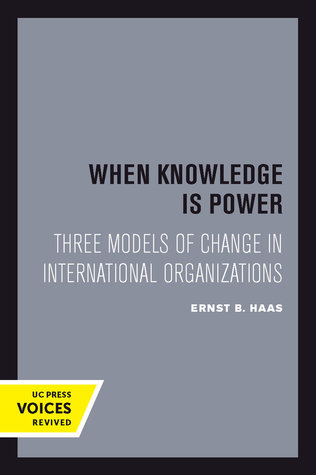(PDF) Download When Knowledge Is Power: Three Models of Change in International Organizations (Studies in International Political Economy) (Volume 22) by Ernst B. Haas to read
Ebook [PDF & EPUB] Download When Knowledge Is Power: Three Models of Change in International Organizations (Studies in International Political Economy) (Volume 22) by Ernst B. Haas to Read
Download or Read When Knowledge Is Power: Three Models of Change in International Organizations (Studies in International Political Economy) (Volume 22) by Ernst B. Haas in PDF or EPUB. Easy access for online or offline reading on any device.

Get instant access via the links below:
Direct & secure access to When Knowledge Is Power: Three Models of Change in International Organizations (Studies in International Political Economy) (Volume 22) by Ernst B. Haas in minutes!
ABOUT BOOK
Do governments seeking to collaborate in such international organizations as the United Nations and the World Bank ever learn to improve the performance of those organizations? Can international organizations be improved by a deliberate institutional design that reflects lessons learned in peacekeeping, the protection of human rights, and environmentally sound economic development? In this incisive work, Ernst Haas examines these and other issues to delineate the conditions under which organizations change their methods for defining problems. Haas contends that international organizations change most effectively when they are able to redefine the causes underlying the problems to be addressed. He shows that such self-reflection is possible when the expert-generated knowledge about the problems can be made to mesh with the interests of hegemonic coalitions of member governments. But usually efforts to change organizations begin as adaptive practices that owe little to a systematic
Related Articles
(PDF) Download When Languages Die: The Extinction of the World's Languages and the Erosion of Human Knowledge (Oxford Studies in Sociolinguistics) By K. David Harrison to read
Ebook [PDF & EPUB] Download When Languages Die: The Extinction of the World's Languages and the Erosion of Human Knowledge (Oxford Studies in Sociolinguistics) By K. David Harrison to Read Download or Read When Languages Die: The Extinction of the ...(PDF) Download When Hitler Stole Pink Rabbit By Judith Kerr to read
Ebook [PDF & EPUB] Download When Hitler Stole Pink Rabbit By Judith Kerr to Read Looking to Download or Read When Hitler Stole Pink Rabbit By Judith Kerr? You can get the full book in PDF or EPUB format, perfect for reading on any device. Whether you ...(PDF) Download When Hitler Stole Pink Rabbit / Bombs on Aunt Dainty By Judith Kerr to read
Ebook [PDF & EPUB] Download When Hitler Stole Pink Rabbit / Bombs on Aunt Dainty By Judith Kerr to Read Download or Read When Hitler Stole Pink Rabbit / Bombs on Aunt Dainty By Judith Kerr in PDF or EPUB. Easy access for online or offline reading on ...(PDF) Download What Would Skeletor Do?: Diabolical Ways to Master the Universe By Robb Pearlman to read
Ebook [PDF & EPUB] Download What Would Skeletor Do?: Diabolical Ways to Master the Universe By Robb Pearlman to Read Download or Read What Would Skeletor Do?: Diabolical Ways to Master the Universe By Robb Pearlman in PDF or EPUB. Easy access for ...(PDF) Download When God Was a Woman by Merlin Stone to read
Ebook [PDF & EPUB] Download When God Was a Woman by Merlin Stone to Read Download or Read When God Was a Woman by Merlin Stone in PDF or EPUB. Easy access for online or offline reading on any device. Get instant access via the links below: => ...